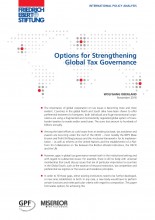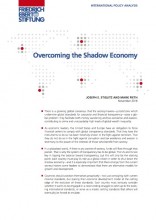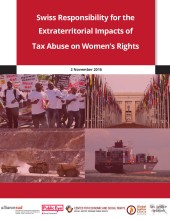
Development Finance & Tax Justice - Archive
There is a growing global consensus that the secrecy-havens—jurisdictions which undermine global standards for corporate and financial transparency—pose a global problem: they facilitate both money laundering and tax avoidance and evasion, contributing to crime and unacceptably high levels of global wealth inequality.
As economic leaders, the United States and Europe have an obligation to force financial centers to comply with global transparency standards. That they have the instruments to do so has been forcefully shown in the fight against terrorism [...]
A report published today by the Greens/EFA group in the European Parliament reveals how the German chemical multinational BASF has been avoiding paying taxes in the European Union on a grand scale for years. The company BASF makes targeted use of tax advantages in individual countries, and particularly benefits from tax havens such as Belgium, Malta and the Netherlands. Between 2010 and 2014, BASF henceforth, saved a total of almost one billion euros in taxes. Belgium allows the deduction of [...]
Switzerland—arguably the world's leading tax haven—faced tough questions from a UN human rights body in Geneva today over the toll that its tax and financial secrecy policies take on women's rights across the globe. Prompted by a submission from CESR, Alliance Sud, the Global Justice Clinic at NYU School of Law, Public Eye and the Tax Justice Network, the UN Committee mandated to oversee compliance with the Convention on the Elimination of All Forms of Discrimination Against Women (CEDAW) probed [...]
By Aldo Caliari
Due to UNCTAD’s decidedly pro-South and uncompromising development-focused mission, its quadrennial conferences have traditionally been North –South showdowns. Coming a few months after the adoption of the ambitious and universal 2030 Agenda for Sustainable Development and its 17 associated goals, the theme of the XIV Quadrennial Conference of UNCTAD (the United Nations Conference on Trade and Development) was “From Decisions to Actions.” There was, therefore, reason to expect that this time members would bridge their differences for [...]
By Barbara Adams and Sarah Dayringer
Less than one month ago the UN Commission on the Status of Women (CSW) adopted its “ agreed conclusions” on “Women’s empowerment and the link to sustainable development.”
From 18-20 April, the Financing for Development Forum (FfD Forum) will provide an early test on the commitment and ability of Member States and the UN system to finance the 2030 Agenda for Sustainable Development and address structural obstacles to development.
The CSW Agreed Conclusions state [...]
By Barbara Adams and Sarah Dayringer
Less than one month ago the UN Commission on the Status of Women (CSW) adopted its “ agreed conclusions” on “Women’s empowerment and the link to sustainable development.”
From 18-20 April, the Financing for Development Forum (FfD Forum) will provide an early test on the commitment and ability of Member States and the UN system to finance the 2030 Agenda for Sustainable Development and address structural obstacles to development.
The CSW Agreed [...]
During the United Nations observance of International Women’s Day 2016, Barbara Adams from Global Policy Forum and Social Watch addresses the obstacles to Women’s Rights: the unfair global trade and investment system and the lack of a debt workout mechanism deviate the resources that should ensure an universal social protection floor.
See the video here.
Tax avoidance and evasion represent a systemic drain on government revenues needed for the fulfillment of women’s rights and gender equality. As the international human rights system begins to grapple with the consequences of tax policy for human rights, a groundbreaking initiative is about to shine a bright light into the dark corners of financial secrecy.
Switzerland – arguably the world’s most important tax haven — may soon face scrutiny from the United Nations human rights system over its role [...]
One of the concrete commitments from the Addis Ababa Action Agreement and the 2030 Agenda for Sustainable Development (2030 ASD) is the Technology Facilitation Mechanism (TFM). Spearheaded by Brazil and France, the development of the TFM has been described by Sérgio Rodrigues dos Santos of Brazil, as a “testimony to the strength of multilateralism through collective action.”
Expectations are high for TFM in a briefing on its progress, the President of the UN General Assembly lauded the TFM launched in [...]
Dear Ambassador,
On September 10th the international community must take an important step towards better prevention and resolution of sovereign debt crises. Adoption of the UN General Assembly Resolution “Basic Principles on Sovereign Debt Restructuring Processes” would be a milestone towards ensuring that debt crises can be tackled in a timely, orderly, effective and fair manner. As a Europe-wide and international coalition of civil society organisations working on debt justice, we urge you to vote in favour of this Resolution [...]





